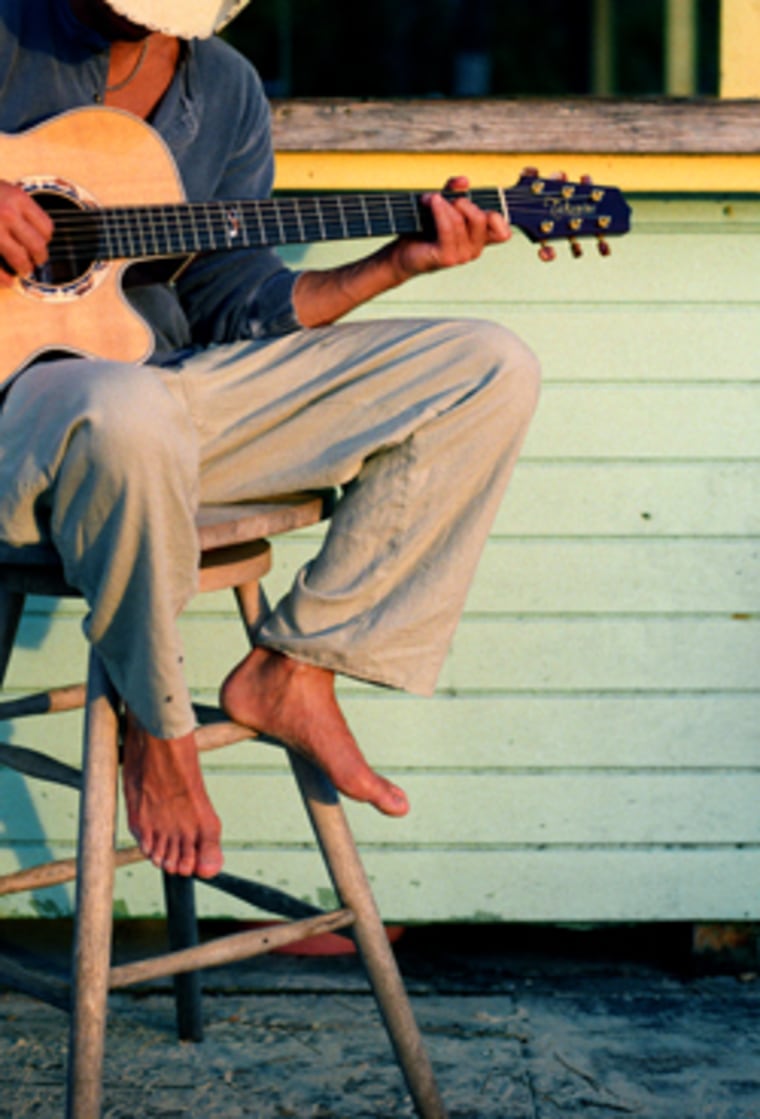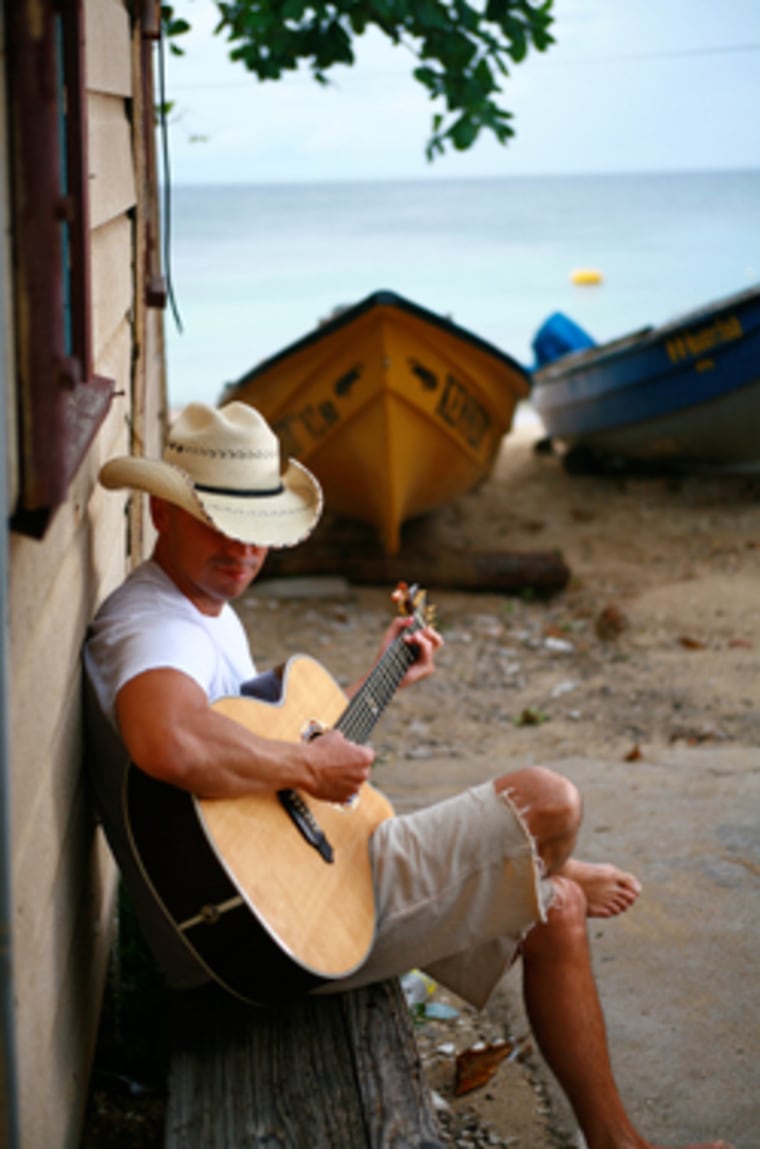In his high-energy concerts, Kenny Chesney sings about a “hillbilly rock star out of control, livin’ in fast-forward.” It’s a nod to one facet of a demanding realm of show business that keeps him on the road for three-quarters of the year. That’s what it takes to stay on top: He’s won the Country Music Association Entertainer of the Year award four times in a row, and he’s perennially one of the top box-office artists of any genre. Yes, he has also fallen victim to one of the head-spinning pitfalls of life in the fast lane — notably a four-month marriage to Renée Zellweger in 2005.
Through it all, the Caribbean is Chesney’s solace and source of inspiration for his most personal and prettiest songs, the ones that are more Jimmy Buffett-meets-James Taylor than hillbilly rock star. (He has a house and keeps a boat on St. John.) We spoke recently about his new album, "Lucky Old Sun," and his Caribbean journey.
A lot of people would find it surprising that the top Nashville star has gone from writing songs about driving a tractor in Tennessee to boating around the Caribbean. How would you explain that?
I’ve always had an island soul to me. I grew up in Knoxville in the foothills of the Smoky Mountains, but somewhere in my family tree there must’ve been someone who was a beach bum at heart. I’ve always felt a certain sense of peace and freedom on the boat that I don’t get on the tour bus. On the road, there’s always something to do and someplace to be. My life is full of expectations. But on the boat I can take a deep breath and be myself.
Thanks to Jimmy Buffett, most people have an idea of what “boat music” is. What does it mean to you?
It’s laid-back and acoustic. My boat playlist has a lot of singer-songwriters like Jimmy, Bob Marley, Jackson Browne and Jack Johnson. It’s the soundtrack to sitting out there and pulling a beer out of the cooler and watching the sun move across the sky. I’ll take three or four of my new songs out on the boat and watch the sunset with that music, and ask, “Does this music reflect this atmosphere? Does it speak to more people than just me?” It’s important to reflect a sense of what that life is really like, how time hangs in the balance.
On your new album there’s a song called “Nowhere to Go, Nowhere to Be,” which has a character named Trinidad Charlie. Where did you meet him?
It was the middle of my 2006 tour, and I was exhausted and in a funky place mentally, between the pressures of the road and the breakup with Renée. I got three days off, so I went down by myself, and one day I got in my Jeep and drove over to a funky bar on the north side of St. John called Island Blues. I ordered gumbo and a beer and sat there all afternoon next to Trinidad Charlie, this local cat who sells hot sauce. For the first time in a long time I felt a stillness in my heart and mind. It was a good day. I went home and pulled out the notes I wrote at the bar, watched the sunset, stared at St. Thomas and wrote this song. And that’s where this album was born.
You recorded another song and a video with the Wailers. How did that happen?

They were making a record and contacted me to write a song for it. “Everybody Wants to Go to Heaven” is the first single from my new album, and I wanted it to have a certain feel. I wanted it to be tropical, but not at the beach; I wanted to show part of the culture. I’ve been to Jamaica several times, and I’ve fallen in love with the people down there, so I called the Wailers and asked them to be in the video. Next thing you know, here I am shooting a performance in a funky beach bar [Time ’n’ Place, in Falmouth, Trelawny].
I had a chance to talk to Familyman about what it was like back in the day and whether they knew the music would mean as much to the world as it does now. Family said Bob was pretty much clairvoyant and knew the music would mean more in the future. And to me, they recorded some of the most far-reaching music of all time. Here I am in country music, and my life has been so touched by it. We’re from two different worlds, but I learned from the Wailers the true meaning of “One Love.” Everybody’s got one heart, one soul; everybody’s in this world together, and the music is one.
The song “Boats” gets to the heart of the matter with the lyric “vessels of freedom, harbors of healing.” How did that song come about?
I was with my captain and a couple of songwriting friends off of St. Croix. I could tell a girl on another boat was staring at my boat with binoculars, and I felt like I was on display at the zoo. The tipsy, carefree part of me grabbed a beer and got in the dinghy and went over and introduced myself. After the shock wore off, I asked them where they were from, and her father said they were from Newport, Rhode Island, and that the year before his wife had passed. So he bought a boat and sailed it down. [Kenny sings:]
Now 40 feet of sail and teak is where John calls home/ He watched his life pass before his eyes in the middle of a hurricane/ Came out on the other side — that’s where the other side got its name.
It wasn’t a literal hurricane; it was his wife’s death and his grief. He got through and came out OK. Of course, I was using my boat as a safe harbor, too. People live in boats for a lot of different reasons — not just to spill drinks on them. We shook hands and had a cocktail, and I thanked him for a great song. Best dinghy ride I ever took!
Three years ago we talked about your Caribbean journey and how you found a sense of home and community in St. John. Can you bring us up to speed with the progress of that journey?
Slideshow 20 photos
Caribbean way of life
It’s changed for me a little. I wrote a record ["Be As You Are"] about my truth and a place that gave me a sense of place and a freedom I’d never found. But as a result, the freedom went away a little bit. I feel more eyes on me. I feel guilty for bringing attention to places that didn’t really need it. If I could do it over again, I wouldn’t give such a blueprint.
Themes of healing and acceptance run through the new songs, like “Way Down Here” and “I’m Alive.”

The day after Christmas 2005 I was in the middle of the aftermath of the Renée breakup. I was as miserable as a person could’ve been. I flew out of Knoxville on a gray, cold, rainy day, and my buddies picked me up. I looked at my captain and said, “If I’m gonna be down, I’m gonna be down here.” And I took a deep breath, felt the warm air and a breeze and said, “I’m gonna be OK.”
“I’m Alive” was written that January. The night before, we went out raging on the island, and when I do that, I tend to invite the whole town to go out on the boat the next day. But that didn’t happen because we slept ’til 3 o’clock. The boat was a mess, the captain, Ben, looked horrible, and I said, “Are you OK?” and he said, “I’m alive.” I took out the guitar and wrote a song about being in the moment, not looking forward or back. It was just great to be on the boat that day, to be alive and have music in my life. It’s a “lesson learned” song. We all make mistakes and beat ourselves up, but I was ready to start again.
Neil Young says, “It’s all one song.” What’s Kenny Chesney’s Caribbean song all about?
Especially with this album, it’s an expression of a state of mind. There are bars in the islands where you have to jump off your boat and swim ashore and pay for your drinks with wet money. I hope that when people hear this music, they’ll feel that and feel their feet sinking in the sand as the waves come in. I want people living on boats to throw it on after dinner and have a cocktail with their friends and family.
Everybody’s busy and has things going on in their life, some they can control and some they can’t. Everybody needs to let go, exhale, have times with themselves and times with people — and I’ve done all that on my boat. Not everybody can experience that. If I can bring that to people’s lives, I think that’s a good thing.

